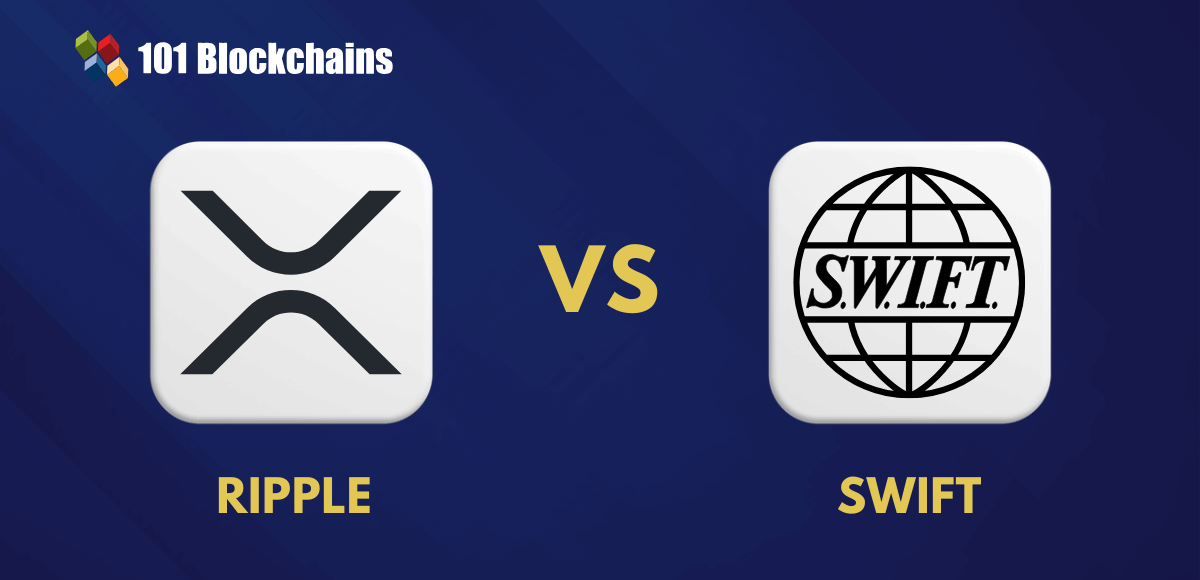Learn how blockchain truly works, master key definitions, and uncover what makes smart contracts so "smart." Dive into the fundamentals, gain valuable insights, and start your blockchain journey today!

Comparisons
Georgia Weston
on January 05, 2022
Web 3.0 vs Metaverse – Key Differences
The arrival of new technologies has always brought mixed propositions in any scenario. For example, the internet arrived years ago, and concerns regarding privacy are still a huge topic for debate regarding the usability of the internet. The same phenomenon is clearly evident in web 3.0 vs metaverse comparisons to identify the better alternative. Which technology trend would shape the Internet of the future? Will you access the internet through the Metaverse or Web 3.0? Many such questions have been gaining a lot of attention in recent times, especially after big companies have decided to enter the metaverse with their applications.
As the world struggles to familiarize itself with the fundamentals of the metaverse, discussions about Web 3.0 also present critical implications. However, you can find a clear impression of metaverse vs Web 3.0 by understanding what they are. Both the terms would have a massive and sustained impact on the future of connectivity. Therefore, it is important to reflect on the differences between them and their implications for the future of digital technologies. The following article helps you find out the difference between Web 3.0 and Metaverse and identify how they complement each other perfectly.
History of the Internet
Prior to a detailed discussion on Web 3.0 and metaverse, it is important to look back on the history of the internet. Tracing back in the history of the web, you can find out how the world has arrived on Web 3.0. The first iteration of the Web or Web 1.0, also known as the Classic Web, arrived in 1991. Tim Berners Lee introduced the world to the internet, and the age of Web 1.0 lasted till 2004. During the Classic Web phase, the internet focused primarily on offering documents through HTML pages, which are accessible through browsers.
Then came Web 2.0, which brought corporations into the mix. Web 2.0 was obviously different from Web 1.0 as corporations were primarily responsible for developing the second phase of the web. Now, apps replaced browsers, and the web focused on enabling users to read as well as create and deliver content. As a result, we were able to witness the rise of social media alongside e-commerce. So, web 2.0 has successfully introduced read/write functionalities on the internet alongside establishing the foundation of platform economy. What does Web 3.0 bring to the table? As the next iteration of the internet, how can Web 3.0 compete with the concept of a metaverse? Let us find a clear overview of Web 3.0 before we dive into a Web 3.0 vs metaverse comparison.
Learn the fundamentals, challenges and use cases of Web3.0 blockchain from Web 3.0 Blockchain E-Book
Definition of Web 3.0
Many people think of Web 3.0 as the next step in the development of the Internet. It is practically a revolution of sorts in the fundamental precedents of the way the web works. However, it is also important to note that there is no specific definition for Web 3.0. Why? It is still a concept under development. The father of the internet, Tim Berners Lee, feels that the semantic web would be the next big milestone in the evolution of the internet. The semantic web focuses on ensuring that every content on the internet is machine-readable. However, people would wonder if virtual assistants such as Alexa and Siri are already doing the same. So, does this mean that we are currently in the third generation of the web?
The perception of Web 3.0 and metaverse has changed considerably since 2020, especially with the incorporation of blockchain. As a result, the focus of Web 3.0 has shifted towards the creation of a decentralized web. You must be wondering about the need for decentralization in today’s web when anyone can access the internet. However, a major share of the web belongs to big tech corporations, thereby establishing a solid case for a decentralized web. Apart from decentralization, web 3.0 also includes many other prominent topics such as Non-fungible Tokens or NFTs, Decentralized Finance or DeFi, and Decentralized Autonomous Organizations or DAOs.
Before you find out the difference between Web 3.0 and metaverse, you can perceive Web 3.0 as a new approach for developing a new financial world. The focus of Web 3.0 would largely rely on addressing competition from the renowned platform players. In addition, it would also aim at introducing new forms of collaboration among web users.
Curious to develop an in-depth understanding of web3 application architecture? Enroll Now in Web3 Application Development Course
Enter the Metaverse
As one of the most talked-about topics in the world of technology, the metaverse has forced many industry experts to wonder about its potential implications. The participation of huge companies such as Facebook, Microsoft, and Epic Games showcases favorable prospects for the metaverse. In addition, the metaverse vs web 3.0 comparisons also draw attention to the metaverse.
So, what exactly is this metaverse? In simple words, the metaverse is a digital space that merges physically persistent virtual spaces with virtual, augmented physical reality. You can think of the metaverse as a representation of the digital world you can access through your smartphones, albeit in a 3D representation. Imagine shopping for clothes in a digital store as an avatar by trying out the clothes to check the fit. The metaverse would basically combine different digital spaces in a world where users could move seamlessly between the different spaces. The different digital spaces in the metaverse can allow participants to leverage unique functionalities.
For example, they can play games with friends or collaborate with colleagues for work in the metaverse. The basic definition of the metaverse also shows its potential for becoming the future of the internet. Therefore, you can clearly notice how the web 3.0 vs metaverse discussion becomes relevant in the present times.
Want to get an in-depth understanding of metaverse concepts? Enroll now in the Metaverse Fundamentals Course
Difference between Metaverse and Web 3.0

Please include attribution to staging2.staging2.101blockchains.com with this graphic. <a href='https://staging2.staging2.101blockchains.com/blockchain-infographics/'> <img src='https://staging2.staging2.101blockchains.com/wp-content/uploads/2022/01/Web-3.0-vs-Metaverse-16001600-1.png' alt='Web 3.0 vs Metaverse='0' /> </a>
With a clear impression of the basics of Web 3.0 and Metaverse, one would definitely wonder whether they are actually different from one another. Web 3.0 supports decentralization, and the metaverse allows anyone to move freely in the metaverse and trade their assets with complete transparency. While some similarities do exist between Metaverse and Web 3.0, the differences between them garner more attention. Here is an outline of the points of difference between Web 3.0 and Metaverse in detail.
Learn the fundamentals of Web 3.0 with the Web 3.0 Flashcards.
-
Definition
The first thing we have for a basic metaverse vs web 3.0 comparison would obviously refer to their definitions. The metaverse is a digital world where you can interact with three-dimensional objects in virtual reality. With the use of virtual reality headsets, the metaverse will help users interact with other users and objects in the virtual space.
On the other hand, web 3.0 is basically the evolution of the approaches through which users can control digital assets and online identities. With Web 3.0, users could create the content of their choice alongside controlling and monetizing the content. Therefore, web 3.0 is a concept for the next generation of the Internet where users can exercise ownership over their creations.
-
Underlying Technology
The next important factor for a web 3.0 vs metaverse comparison would be the underlying technology in both of them. The metaverse has different crucial technologies for enabling the whole ecosystem. You would need connectivity, interfaces, decentralization, creator economy, experiences, and enabling technologies for developing the metaverse.
Web 3.0 focused on creating a decentralized web that would rely on blockchain and cryptocurrencies only. Blockchain can help users interact with online services under the governance of a decentralized network of computers. Furthermore, web 3.0 can also leverage public blockchain functionalities to enable open and permissionless access for any individual with an internet connection.
-
Scope of Applications
Another prominent factor in the difference between Web 3.0 and Metaverse would draw references to their potential applications. Metaverse is a newly emerging dimension that brings movies, entertainment, gaming, education, simulation-based training, and social platforms into one platform. However, all of these applications within the metaverse are still under development. So, it is too soon to assume that the metaverse would be capable of mirroring almost all real-world activity.
Web 3.0 is actually a standard for the new generation of the internet. You can think of it as a set of rules applicable to every internet user. Therefore, it is quite clear that Web 3.0 would be applicable throughout the web rather than for specific applications.
Build your fluency in advanced technologies and develop decentralized solutions for the emerging Web3 ecosystem as a Web3 expert with Web3 Expert Career Path
Conclusion
The final take from the web 3.0 and metaverse debate is that both technologies support each other perfectly. You can clearly identify how the metaverse and Web 3.0 are more related and dependent on each other. The metaverse is a digital space and Web 3.0 favors a decentralized web, which could serve as the basis for connectivity in the metaverse.
In addition, the creator economy in the metaverse can supplement the vision of Web 3.0 for developing a new financial world with decentralized solutions. However, the metaverse is a long way from development and would require a formidable boost in terms of underlying technology. On the other hand, web 3.0 is shaping up perfectly with the formidable growth of NFTs and DeFi recently. Let us wait and watch out for how the metaverse and Web 3.0 shape up in the future.
*Disclaimer: The article should not be taken as, and is not intended to provide any investment advice. Claims made in this article do not constitute investment advice and should not be taken as such. 101 Blockchains shall not be responsible for any loss sustained by any person who relies on this article. Do your own research!






